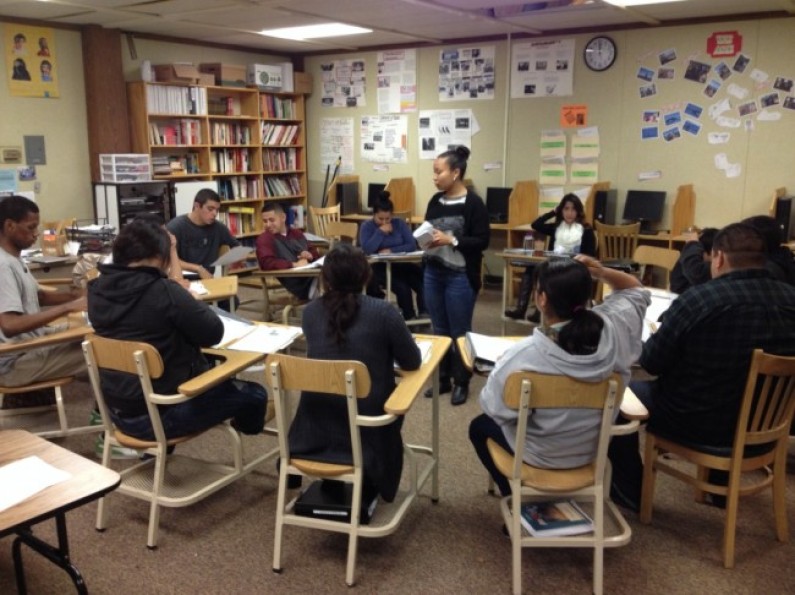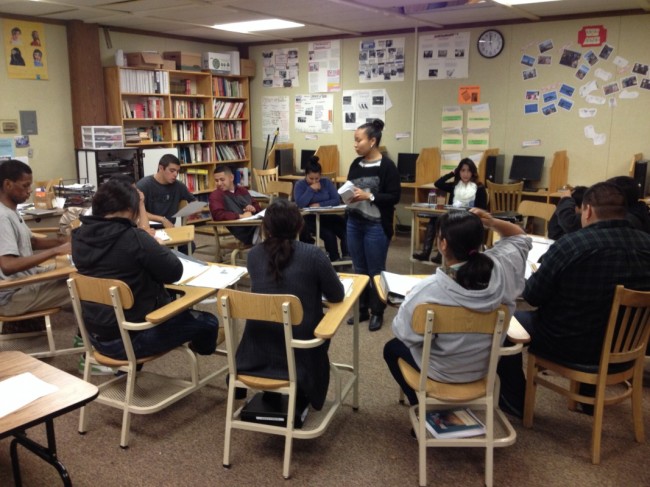

Peter Elbow, professor emeritus at the University of Massachusetts – Amherst, uses a method of revising writing assignments in his classes that is so simple that it is profound. The professor believes and practices the principle of revising by reading aloud, a simple yet effective method. He makes the claim, and presents extensive first-hand evidence to prove it, showing that when students read aloud their writing samples during the revision process, their writing improves dramatically.
Professor Elbow’s strategy is based on the intriguing notion that much of the grammatical rules for revision become unnecessary when a writer hears himself speaking out loud the words of his writing. His method presumes something that almost everyone is aware of — that the mouth, ears and brain work together to produce ideas and that working together they produce very authentic writing.
In his Vernacular Eloquence, Elbow points out that “When reading aloud helps us to experience our own words, it helps us experience how others will experience them.” Of course, how others experience spoken words is the perspective of the reader as he reads what a writer has written. Elbow believes that this process helps the writer to step into the mind and heart of the reader and thus communicate more effectively.
He appears to have as his purpose to take much of the technical, grammatical sting out of the learning of writing. He summarizes in chapter 11 of a draft of one of his books why he has undertaken this campaign: “…to show how we can write with whatever variety of English comes most easily and naturally to our mouths and minds.” As a writer starts off writing in a comfortable place, not worrying about the conventions of grammar, then reads for revision later on, he often discovers that less adjustments need to be made. Revising by reading aloud has the potential to save time and stress.
Elbow offers much evidence gleaned from his classes for the efficiency of revising by reading aloud. He makes the point that speaking to get the words right tends to sharpen the thinking process. This connects back to what he says about the mouth, ears and brain working together. The thinking process is enhanced as we involve all three and the way to do that is read aloud the written words. As one reads aloud, the thinking process will pick up on writing construction, fluency, clarity, mistakes and much more.
“How does reading aloud improve prose?” as he put it in his draft, is the simple question Elbow is asking. He delves into the real effects that revising by reading aloud has on the writer and what actually happens to make his writing better. One thing he stresses is that reading aloud helps students to learn to listen to themselves while they are writing. A person hears more meaning when the words are coming through the brain and out of the mouth. He also makes the point that a writer’s knowledge of writing principles often get in the way of clarity and strength in writing. Reading aloud helps the principles become more real as they are spoken and heard.
Over the years the professor has noticed that the good writers in his classes have “…always instinctively tested everything they wrote against mouth and ear.” This is convincing evidence coming from his observations of students in his class. He found that there was a clear connection between the skilled writers and reading out loud. Revising by reading aloud came naturally to some students and most of them turned out to be good writers.
This approach can be applied to a whole piece of writing as well as to revision of sentences or paragraphs. As the writer reads his work he will hear whether or not it flows together as one piece or has sentences without connection or paragraphs that drift from the theme. He constantly encourages his students to “Make it right for your mouth and ear. Make it speakable.” The feel of the writing comes out more quickly when revising by reading aloud.
In this age of educational confusion when many American students are falling quickly behind in their skills, Elbow offers real hope for students who shy away from the challenge of writing and for teachers who struggle to get the job done. Revising by reading aloud provides a natural, relaxed way to take some stress out of the writing/editing process and bring back some of the fun that comes with success.
By Lloyd Gardner
Sources:
Peter Elbow: Vernacular Eloquence, page 238.
Peter Elbow: Revising by Reading Aloud. What the Mouth and Ear Know
Boston Globe.com: Write Like You Say
Photo Courtesy of Lloyd Gardner


